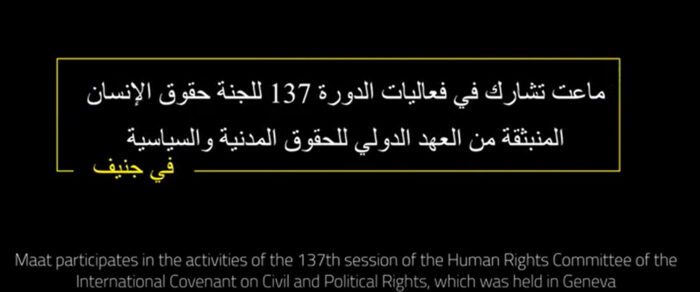Maat participates in the official session to discuss the fifth periodic report of the Arab Republic of Egypt during the 137th session of the Human Rights Committee
"Okeil": We call on the international mechanisms to establish a clear mechanism to ensure that the facts of enforced disappearance are documented
Maat for Peace, Development and Human Rights participated in the activities of the 137th session of the Human Rights Committee of the International Covenant on Civil and Political Rights, which was held at Wilson Palace in Geneva, on February 27, 2023. During the 137th session of the Human Rights Committee, the fifth periodic report of the Arab Republic of Egypt was discussed over two sessions with the Egyptian government delegation that provided clear answers to all the questions and inquiries raised by the Committee members on number of issues, including: “enforced disappearance, violence against women and discrimination, conditions of prisons, pretrial detention, anti-terrorism measures, allegations of torture in prisons, execution of the death penalty, peaceful demonstration, migrants and refugees, and the LGBT community.
Maat participated in the official session discussing the fifth periodic report of the Arab Republic of Egypt which was attended by the Egyptian government delegation headed by Counselor Omar Marwan, Minister of Justice, and included Dr. Maya Morsi, President of the National Council for Women, Ambassador Khaled Al-Bakli, Assistant Foreign Minister for Human Rights and head of the Technical Secretariat of the Supreme Standing Committee of Human Rights Khaled Al-Bakli, Ambassador Ahmed Ehab Gamal El-Din, Egypt's permanent representative to the Human Rights Council in Geneva, as well as members of the public prosecution. The government delegation reviewed the developments in the human rights file in Egypt.
Maat also participated in the official briefing session for CSOs on the review of the Arab Republic of Egypt, which was held on the morning of February 28, 2023, and delivered an oral intervention on guarantees of personal safety, alternative penalties to pretrial detention, anti-discrimination measures, freedom of information exchange, anti-torture issues, and combating all forms of violence against women.
Moreover, Maat participated in the second session on the review process, which was held on the morning of March 1, 2023 as an observer. All questions, inquiries and observations were addressed in the second session and the government delegation was given the opportunity to provide additional information in writing before 1 p.m. in the afternoon of Friday, March 3, 2023.
In addition to the oral intervention it presented, Maat made a set recommendations, such as revising the articles of pretrial detention in the Criminal Procedure Code; examining the rest of the requests submitted to the Presidential Pardon Committee and the release of other batches of prisoners. Maat also recommended considering the establishment of the Independent Commission for Combating Discrimination in accordance with Article 53 of the Constitution, and getting the draft law on combating all forms of violence against women discussed by the House of Representatives to as soon as possible; considering the harmonization of the definition of torture contained in Egyptian law with the definition contained in Article 1, which Egypt ratified; uniting efforts between CSOs, the Supreme Standing Committee for Human Rights (SSCHR), and the Human Rights Committee in Parliament to carry out community consultations that integrate all stakeholders to present proposals to achieve the greatest possible outcomes of the national strategy
For his part, Ayman Okeil, an international human rights expert and President of Maat, made another oral intervention on "enforced disappearance", and pointed out that in its previous meetings with the Working Group on Enforced Disappearance in the Human Rights Council, Maat asked about the Working Group’s mechanisms to verify the validity of the reported facts of enforced disappearance, as well as the mechanisms to ensure the veracity of the state's responses. The working group's response was that there is no way to verify the allegations of both sides.
Okeil demanded, in his intervention, the need for establishing a clear mechanism to ensure the documentation of the facts of enforced disappearance, especially since the alleged cases of enforced disappearances are not dropped unless the person, his dead body or remains appear, referring that enforced disappearance is occasionally used to cover the person’s affiliation with a terrorist groups, whether in North Sinai or Syria.

shortlink: https://maatpeace.org/en/?p=37872












